The Valley of Amazement Read online
Page 2
Once you stepped into the vestibule, however, all signs of the Ming vanished. At your feet was a colorful pattern of encaustic Moorish tiles, and facing you was a wall of red velvet curtains. When they were drawn back, you were borne into a “Palace of Heavenly Charms,” as my mother called it. This was the Grand Salon, and it was entirely Western. That was the fashion in the better courtesan houses, but my mother’s sense of Western fashion was authentic and also daring. Four hundred years of cold echoes had been muffled by colorful tapestries, thick carpets, and an overabundance of low divans, stiff settees, fainting couches, and Turkish ottomans. Flower stands held vases of peonies the size of babies’ heads, and round tea tables were set with lamps that gave the salon the honeyed amber glow of a sunset. On the bureaus, a man could pluck cigars out of ivory humidors and cigarettes out of cloisonné filigreed jars. The tufted armchairs were engorged with so much batting they resembled the buttocks of the people who sat in them. Some of the decorations were quite amusing to the Chinese. The blue and white vases imported from France, for example, were painted with depictions of Chinese people whose faces resembled Napoleon and Josephine. Heavy mohair curtains covered the lattice windows, weighted with green, red, and yellow tassels and fringe as thick as fingers, Carlotta’s favorite toys. Chandeliers and wall sconces illuminated the paintings of rosy-cheeked Roman goddesses with muscular white bodies, who cavorted next to similarly muscled white horses—grotesque shapes, I heard Chinese men say, which depicted, in their opinion, bestiality.
On the right and left sides of the Grand Salon were doorways that led to smaller, more intimate rooms, and beyond them were covered passageways through courtyards that led to the scholar’s former library, painting studio, and family temple, all cleverly transformed into rooms where a businessman could host a dinner party for friends and be entertained by ladylike courtesans who sang with heartbreaking emotion.
At the back of the Grand Salon, my mother had installed a curved carpeted staircase with a red-lacquered wooden banister, which took you up to three curved, velvet-lined balconies modeled after those found in opera houses. They overlooked the Grand Salon, and from them I often viewed the festivities below as Carlotta strolled back and forth on the balustrades.
The parties began after sundown. Carriages and rickshaws arrived throughout the night. Cracked Egg, the gatekeeper, would have already memorized the names of those who were coming, and they were the only ones allowed to enter. From my perch, I saw the men burst through the red curtains and into that palatial room. I could tell if a man was a newcomer. He would gaze at the scene before him, scanning the room, incredulous to see Chinese and Western men greeting each other, speaking with civility. The Westerner would have his first glimpse of courtesans in their habitat. He might have only seen them passing by on the thoroughfare in carriages, dressed in their furs and hats. But here, they were within reach. He could speak to one, smile with admiration, although he learned quite emphatically that he was not allowed to touch. I was delighted to see my mother inspire awe in men of different nationalities. She possessed the power to render men speechless from the moment they walked into the room.
Our courtesans were among the most popular and talented of all the girls working in the first-class houses of Shanghai—elegant, seductively coy, tantalizingly elusive, and skilled in singing or the recitation of poems. They were known as the Cloud Beauties. Each had the word Cloud in her name, and that identified the house to which she belonged. When they left the house—whether to marry, join a nunnery, or work in a lower-class house—the cloud evaporated from their name. The ones who lived there when I was seven were Rosy Cloud, Billowy Cloud, Snowy Cloud, and, my favorite, Magic Cloud. All of them were clever. Most had been thirteen or fourteen when they arrived and would be twenty-three or twenty-four when they left.
My mother set the rules over how they would conduct business with the guests and what share of their earnings and expenses they would pay to the house. Golden Dove managed the courtesans’ behavior and appearance and ensured they upheld the standards and reputation of a first-class courtesan house. Golden Dove knew how easily a girl’s reputation could be lost. She had once been one of the most popular courtesans of her time until her patron knocked out her front teeth and broke half the bones in her face. By the time she mended, with her face slightly askew, other beauties had taken her place, and she could not overcome speculation that she must have greatly wronged her patron to have incited violence in such a peaceable man.
As comely as those courtesans were, every guest, whether Chinese or Western, hoped to see one woman in particular—my mother. From my perch, she was easy to spot by the springy mass of brown curls that graced her shoulders in a careless style. My hair was very much like hers, only darker. Her skin had a dusky tinge. She told people proudly that she had a few drops of Bombay blood in her. No one would have ever honestly described my mother as beautiful, neither Chinese nor foreigner. She had a long angled nose that looked like it had been roughly sculpted with a paring knife. Her forehead was tall and wide—the telltale sign of a cerebral nature, Golden Dove said. Her chin bulged like a pugnacious little fist, and her cheeks had bladed angles. Her irises were unusually large, and her eyes lay in deep, dark sockets, fanned by dark lashes. But she was captivating, everyone agreed, more so than a woman with regular features and great beauty. It was everything about her—the smile, the husky and melodious voice, the provocative and languorous movement of her body. She sparkled. She glowed. If a man received even a glance from her penetrating eyes, he was enthralled. I saw that time and again. She made each man feel he was special to her.
She was without peer in style as well. Her clothes were of her own witty design. My favorite was a lilac-colored gown of near-transparent silk organza that floated above pale pink tussah. It was embroidered with a winding vine of tiny leaves. At her bosom, two pink rosebuds climbed out of the top of the vine. And if you thought the rosebuds were silk as well, you would be only half right, for one was a genuine rose that loosened its petals and released its scent as the night wore on.
From the balcony, I followed her as she crisscrossed the room, the tail of her skirt swishing behind her, the admiration of men in her wake. I saw her bend her face one way to speak to a Chinese man, then at another angle to speak to a Westerner. I could see that each felt privileged that she had selected him for her attention. What all those men wanted from my mother was the same thing. It was her guanxi, as the Chinese called it, her influential connections, as the Westerners put it. It was her familiarity with many of the most powerful and successful Westerners and Chinese in Shanghai, Canton, Macau, and Hong Kong. It extended to her knowledge of their businesses and the opportunities they held, as well as the ones they did not. Her magnetism was her ability to put men and prospects together for profit.
The envious madams of other courtesan houses said that my mother knew these men and their secrets because she slept with all of them, hundreds of men of every shade of skin. Or, they said, she blackmailed them by learning of the illegal means they had used to gain their money. It could also be that she drugged them nightly. Who knew what it took to get those men to give her what she needed to know?
The real reason for her business success had much to do with Golden Dove. Mother said so many times, but in such a roundabout way that I could gather only bits and pieces, which were as a whole too fantastical to be true. She and Golden Dove supposedly met about ten years ago when they lived in a house on East Floral Alley. At the beginning, Golden Dove ran a teahouse for Chinese sailors. Then Mother started a pub for pirates. So Golden Dove made an even fancier teahouse for sea captains, and my mother made a private club for the owners of ships, and they kept outdoing each other until my mother started Hidden Jade Path, and that was that. Throughout that time, Mother taught Golden Dove English and Golden Dove taught her Chinese, and together they practiced a ritual called momo, which thieves used to steal secrets. Golden Dove said momo was nothing more than being quiet. But I
did not believe her.
I would sometimes wander down from my perch with Carlotta and wend my way through a tall labyrinth of dark-suited men. Few paid attention to me. It was as if I were invisible, except to the servants, who, by the time I was seven, no longer feared me as a Whirlwind but now treated me more like a tumbleweed.
I was too short to see past the clusters of men, but I could hear my mother’s bright voice, moving closer or farther away, greeting each customer as if he were a long-lost friend. She gently admonished those whom she had not seen in awhile, and they were flattered that she had missed them. I watched how she guided those men into agreeing with whatever she said. If two men in the room held opposite opinions, she did not take sides but expressed a view somewhere above, and like a goddess, she moved their opinions into a common one. She did not translate their exact words but altered the tone of intention, interest, and cooperation.
She was also forgiving of gaffes, and they were bound to happen, as is the case between nations. I recall an evening when I was standing next to Mother as she introduced a British mill owner, Mr. Scott, to a banker named Mr. Yang. Mr. Scott immediately launched into a story about his winnings at the racetrack that day. Unfortunately, Mr. Yang spoke perfect English, and thus my mother was unable to alter the conversation when Mr. Scott talked excitedly about his afternoon betting on horses.
“That horse had odds of twelve to one. In the last quarter mile, his legs were slashing the air, gaining steady speed all the way to the end.” He shaded his eyes, as if seeing the race once again. “He took the race by five lengths! Mr. Yang, do you enjoy horse races?”
Mr. Yang said with unsmiling diplomacy, “I have not had the pleasure, Mr. Scott, nor has any Chinese I know.”
Mr. Scott quickly replied: “We must go together, then. Tomorrow perhaps?”
To which Mr. Yang gravely replied: “By your Western laws in the International Settlement, you would have to take me as your servant.”
Mr. Scott’s smile vanished. He had forgotten the prohibition. He looked nervously at my mother, and she said in a humorous tone, “Mr. Yang, you must bring Mr. Scott into the Chinese Walled City as your rickshaw puller, and encourage him to make haste like his winning horse to the gate. Tit for tat.”
After they shared a good laugh, she said, “All this talk of speed and haste reminds me that we must work quickly together to secure approval for the shipping route through Yokohama. I know of someone who can be helpful in that regard. Shall I send a message tomorrow?” The next week, three gifts of money arrived, one from Mr. Yang, a larger one from Mr. Scott, and the last from the bureaucrat who had greased the way to the approvals and had a stake in the deal.
I saw how she entranced the men. They acted as if they were in love with her. However, they could not make any confessions of ardor, no matter how true. The warning went around that she would not view them as genuine feelings of love, but trickery to gain unfair advantage. She promised that if they tried to gain her affections, she would banish them from Hidden Jade Path. She broke that promise with one man.
BEHIND THE BALCONIES were two hallways, and between them was a common room, where we took our meals. On the other side of a round archway was a larger room we called Family Hall. It contained three tea tables and sets of chairs, as well as Western furnishings. Here my mother met with the tailor or shoemaker, the tax official, the banker, and others who conducted boring business. From time to time, the occasional mock wedding took place between a courtesan and patron who had signed a contract for at least two seasons. When the room was not in use, more often than not, the Cloud Beauties drank tea and ate sweet seeds, while chatting idly about a suitor no one wanted, or a new restaurant with fashionable foreign food, or the downfall of a courtesan at another house. They treated one another like sisters, tied by their circumstances to this house and this moment in their brief careers. They comforted one another, gave encouragement, and also bickered over petty matters, such as their shared expenses for food. They were jealous of one another but also loaned one another pins and bracelets. And they often told the same stories of how they were separated from their families, culminating in all sharing a good long cry of mutual understanding. “No one should have to bear fate this bitter” was the common refrain. “Fuck that lousy dog” was another.
A hallway led to a courtyard flanked by two large wings of the house, laid out as quadrangles around a smaller courtyard. To the left was the southwest wing, where the Cloud Beauties lived. A covered walkway ran along all four sides, which was how each courtesan reached her room. The lowest-ranked courtesan had the room closest to the hallway, which afforded her the least privacy, since all the other courtesans had to walk past her door and window to reach their rooms. The highest-ranked courtesan had the room farthest from the hallway, which gave her the most privacy. Each long room was divided into two parts. On one side of a tall lattice screen, the Cloud Beauty and her guest could have an intimate dinner. Behind the screen was her boudoir. It had a window facing the inner courtyard, and this was ideal for moon watching. The more popular a beauty was, the more well appointed her room, often lavished with gifts from her suitors and patrons. The boudoirs were more Chinese in style than the furnishings in the salon. No patron wanted to puzzle over which divan to recline on for a smoke, where he could relieve himself, or where he might sleep when he had exhausted himself, or was about to do so.
My mother, Golden Dove, and I lived in the northeast wing. Mother had separate rooms on two sides of the building. One was her bedroom and the other her office, where she and Golden Dove met to discuss the evening’s guests. I always joined her during her late-midday meal, and also remained with her as she readied herself in her bedroom for the evening. This was the happiest time of my day. During that lean hour, she would ask me about the subjects I was learning, and she often would add interesting facts. She would ask about my reported transgressions: what I had done to cause one of the maids to want to kill herself, whether I had been sassy to Golden Dove, how I had torn yet another dress. I offered my opinion on a new courtesan, or on a new hat Mother was wearing, or on Carlotta’s latest antics, and other similar matters that I thought were important to the management of the household.
Mother had another room adjoining her office. These two rooms were separated by French glass doors with thick curtains for privacy. That room was called Boulevard, because its windows faced a view of Nanking Road and it served several purposes. During the day, I took my lessons there with my American tutors. However, if Mother or Golden Dove had guests from out of town, the visitors were given that room as their accommodations. On occasion, a courtesan showed poor planning or excessive popularity by booking two clients for the same night. She would entertain one client in Boulevard and the other in her boudoir. If she was careful, neither client would know of her duplicity.
My room was on the north side of the east wing, and being close to the main corridor, it enabled me to hear the gossip of the four maids who stood just around the corner from my window while awaiting orders to bring tea, fruit, or hot towels and such. As they served the courtesan, they were privy to how well she was succeeding with a new admirer. It always puzzled me why the courtesans assumed the maids were deaf.
“You should have seen her face when the necklace he showed her was worth less than half what she had hoped for. I wasn’t surprised.”
“Her situation is dire. Within a month, she’ll be gone. Ai-ya, poor girl. She’s too good for this kind of fate.”
In the early evening, at least one Cloud Beauty would lead her patron to the larger courtyard below for romantic talk about nature. I stood on the walkway and listened to those rehearsed murmurings so often that I could recite them as wistfully as the courtesans. The moon was a topic they brought up often.
I should be happy seeing the full moon, my love. But I feel sick, because I’m reminded my debts are waxing and your ardor is waning. Why else have you not given me a gift lately ? Should my devotion be rewarded with povert
y ?
It did not matter how generous the patron was. The beauty would press him for more. And often, the long-suffering patron would sigh and tell his courtesan to not cry anymore. He would agree to whatever formula of happiness would quench the girl’s complaints.
That was usually how it worked. But one night, I heard with glee as a patron said: “If you had your way, there would be a full moon every day. Don’t harangue me with this moon nonsense ever again.”
In the late morning, I would hear the girls talking in the courtyard among themselves.
“The cheapskate pretended to be deaf.”
“Just like that, he agreed. I should have asked months ago.”
“His love is genuine. He told me I’m not like other flower beauties.”
By the light of day, they saw different meanings in the sky. How changeable those clouds were, just like fate. They saw ominous signs in wispy streaks high in the sky, noting that they were so far away. They rejoiced when the clouds were as fat as babies’ bottoms, and they were fearful when those babies turned over, showing underbellies that were black. So many Cloud Beauties before them had seen their fates change in one day. They had been warned by the older flower sisters that popularity was as lasting as a fashionable hat. But as their reputations grew, most would forget the warning. They believed they would be the exception.
On cold nights, I cracked open the window and listened to the maids. On warm nights, I opened wide the window and stood quietly in the dark behind my lattice screen shutters. Carlotta sat on my shoulder, and together we listened to the maids talk about what was happening in the rooms of the courtesans. Sometimes they said words I had heard the Cloud Beauties use among themselves: Threading the Needle, Entering the Pavilion, Rousing the Warrior, and many other expressions that made them laugh.

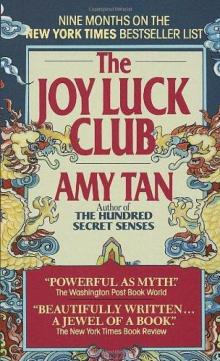 The Joy Luck Club
The Joy Luck Club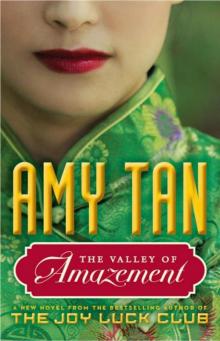 The Valley of Amazement
The Valley of Amazement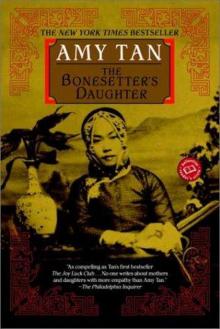 The Bonesetter's Daughter
The Bonesetter's Daughter Saving Fish From Drowning
Saving Fish From Drowning Rules for Virgins
Rules for Virgins The Kitchen God's Wife
The Kitchen God's Wife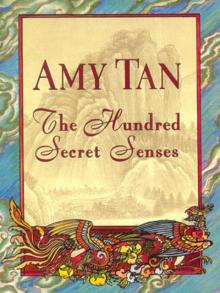 The Hundred Secret Senses
The Hundred Secret Senses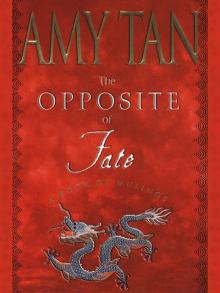 The Opposite of Fate: Memories of a Writing Life
The Opposite of Fate: Memories of a Writing Life Where the Past Begins
Where the Past Begins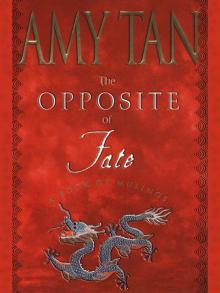 The Opposite of Fate
The Opposite of Fate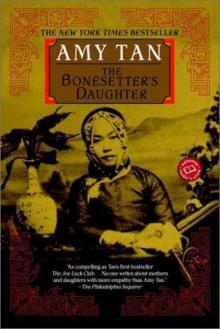 (2001) The Bonesetter's Daughter
(2001) The Bonesetter's Daughter